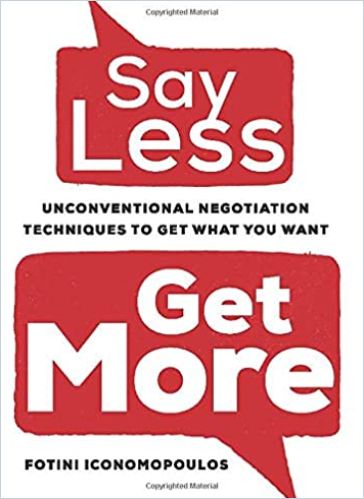Negotiate Like a Pro

It’s performance and end-of-the-year review time again. Here, here and here we have explained how often you should actually conduct such meetings, what is important in remote reviews, and which flaws in thinking you should avoid at all costs. What we have not told you so far: how to prevail. And even if the first thing that comes to mind when you think of clever negotiating might be high-stakes Hollywood-ready hostage negotiators (as in 1998’s The Negotiator) with beads of sweat on their foreheads: Negotiation is not as tedious as you might think.
1. Know What You Want
Are you among the 55% of employees who are toying with the idea of changing jobs in the next few months because you are dissatisfied with the current situation? Fine, but first try to improve your current situation!
Because of the general pressure to keep good people, your cards are good this year and probably also next year to negotiate better conditions.
You should define the latter for yourself and jot down the answers:
- What is not right for you at the moment?
- What would have to change to make it better?
- What can you realistically change by talking to your supervisor? Add up 50% extra requests that would be wonderful, but that you could do without if the rest fit.
- What probably can’t be changed, but is definitely a perspective worth mentioning as a moonshot?

Do you have the feeling that your demands are exaggerated anyway, unrealistic, unattainable – and you would rather not even talk to your boss about it now? Excellent! Let’s get rid of that now.
2. Eliminate Shame (for a While)
When negotiating salary, for example, consider the foregone earnings of failing to negotiate. Picture three college graduates – Andrew, Betsy and Charlie. Each receives an identical job offer of $50,000 a year. Betsy and Charlie negotiate the starting salary and get a 12% increase. So they start at $56,000. All three work for 40+ years and receive a 3% cost of living adjustment each year. Based on that one early successful negotiation, Betsy and Charlie will have earned $500,000 more by the end of their careers than Andrew, who didn’t negotiate at all.

Now imagine that Betsy negotiates every time she switches jobs. If she changes jobs seven times, by the end of her career, Betsy will have earned $1.985 million more than Andrew. The moral of the story? If you go in with 15% plus, but come out with only 7.5%, that’s still hundreds of thousands of dollars more in your working life. Every percent is worth it. This applies not only to your salary but also to all other demands, so keep reminding yourself of it whenever you have doubts.
Negotiation can be painful, but if you work hard at it, you can make it worth your while.
3. Prepare Accordingly
Even if you may have no talent for negotiation, but you’re willing to push through the painful initial learning period, and buckle down, you’ll outperform most of the competition. This is true for any new skill.

Gives and Takes
So, look at the lists from Point 1 and note under each item what convincing arguments you can make, i.e., what has been accomplished and what new goals might be achievable – and for the latter feel free to exaggerate a bit here and there.
- Numbers, facts, and figures about your work over the past (and previous) year might help to show the path you want to take. Solicit useful feedback from colleagues and clients that highlights your accomplishments. The company you work for has many goals. It aims to be productive, profitable and competitive so it can continue to exist into the future. Thus, your best bet for securing a raise is to give specific examples of ways you helped the company reach its goals.
- Look at your employment contract and among current target agreements to see if you haven’t already delivered significantly more than agreed, or if new responsibilities have inflated your basic package without compensation. In this case, cite the writing and match it with the realities. Do you now have a team, i.e., new staff responsibilities that have not been captured anywhere before? Did you take responsibility for a new budget? Have your working hours changed without compensation?
- Remember: Yes, you can go the extra mile sometimes. But extra miles are extra miles because they are “extra.” If they are incorporated, they should be compensated.
- Assess whether more could be achieved by turning a few screws and present that, preferably supported by simple visuals. Show the extra value you “could generate if…”.
- Seek feedback from trusted colleagues on the initiatives you are considering. If you have allies who bring up similar ideas to the same supervisor in their year-end meetings, the likelihood of projects coming to fruition increases.
With all you do: Be careful not to make absurd promises that are completely unattainable. Be aware of your value to your organization, and focus on setting a slightly exaggerated goal to push through your demands to achieve it.
Know Your Counterpart
Even master negotiators will lose if their opponents wield more information, so do your research. First, go over the basics: What are you negotiating? Do you have a deadline? Make an effort to know everything you can about your negotiation partners.

Find out their best-case and worst-case outcomes. Know their best alternative to a negotiated agreement; that is, if they don’t choose you, with whom will they work?
Armed with this knowledge, you can present yourself favorably vis-à-vis the competition. Now it’s up to you to push through what you’ve prepared – and come back with 15% extra.
Pitfalls You Might Want to Avoid
Never make the first offer in a salary negotiation. If you name a number, and the hiring manager immediately agrees, you know you’ve forfeited potential earnings. When making a job offer, many HR representatives will ask about your salary expectations. Dodge this question. Explain that you’re comparing remuneration packages for several job opportunities, and you’d like them to outline their offering. Then wait for them to suggest a number.

Don’t dwell on the reasons you require more money. Instead, focus on the value you bring to your company.
A negotiation should be a collaboration, not a zero-sum game with a clear winner and loser. You want your partner to be happy to work with you in the future. Employ tactical empathy: Arrive with an understanding of the other person’s needs, and use that understanding strategically, to help you reach an agreement that you both can accept.






